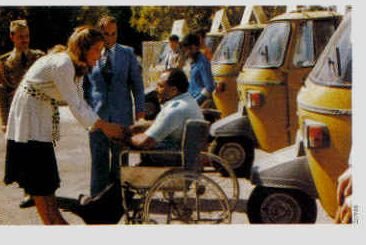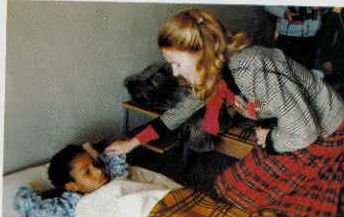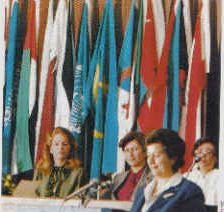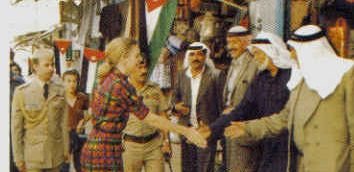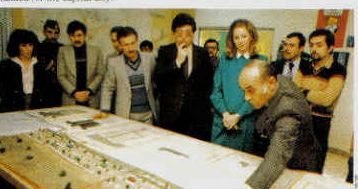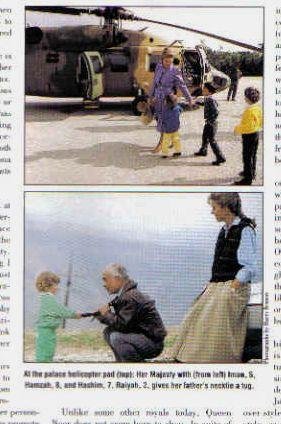Noor Standing Alone--Part 2
IN TRANSITION
She is a queen still but not the queen, an honor that belongs now to Rania, wife of King Abdullah II.
Nor is she, as some mistakenly have said, the Queen Mother: Abdullah is the child of Hussein's English-born second wife, Muna, a somewhat reclusive figure.
But Noor is the mother of the popular crown prince, 19-year-old Hamzeh, a position that gives her a kind of derivative standing, particularly if Hamzeh emerges, as many expect he will, as a strong understudy for Abdullah. She has three younger children as well: Hashem, who graduated from the Maret School in Washington this spring, and daughters Iman and Raiyah, who were enrolled there but are likely to move closer to home to finish high school.
She also has shown an ability to stand on her own in Jordan, where she intends to stay. Viewed disparagingly by some here as an outsider, her bearing impressed Jordanians throughout the king's final days, especially during a public mourning period in which she seemed to be consoling the country as much as the country her.
She has pushed at cultural borders without offending, attending her husband's funeral, for example, even though it went against tradition. Likewise, she has been working quietly to ensure that "honor killings"--the murder of wives, daughters and sisters who have had affairs--are punished like any other crime.
After 20 years at Hussein's side, it may be, as she says, that her relations with Abdullah and Rania are good, that her relations with Jordan's political and social elites are good, and that she will simply operate as usual, giving moral support inside the family, offering advice if asked and sustaining a handful of outside projects.
She will, for example, be organizing a foundation in her late husband's honor. She may pick up a cause here and there that needs a face and a voice, as she did with Princess Diana's efforts to promote a global ban on anti-personnel land mines. And she is tying up the loose ends of her husband's life by honoring invitations he had accepted, including one to speak at Brown University's commencement recently.
But professionally, publicly, Noor is scaling back, telling some organizations she patronized over the past two decades that it is "time to disengage."
She also says she is economizing, laying off household staff and adjusting because her home is no longer a hub for the hundreds of dignitaries and staff passing through for business meetings or banquets or lunches or cups of tea.
She says she may be freer now to speak her mind but, concerned about upstaging the new king, she then has her staff ask a journalist not to publish anything about her during Abdullah's recent visit to Washington.
She utters an aw-shucks, I'm-the-same-as-I've-always-been reply to one question, then speaks of the job of being royalty as potentially "soul-destroying."
Again the thoughts tumble:
"The people of the country and the king have made it clear to me from the beginning, and it has been constant, and this is not by comparison to anyone else, and has little to do with the title, that they want me to continue, that they need me, and at the same time also now there will be more of a role played by the new queen, but there is no reason why that should be in any way anything but a very positive development and hopefully one that will bring us all closer together."
THE MODEST MONARCHY
The odd impression is that, despite a life amid regal trappings, despite the fact that she has given up her U.S. passport, the former Lisa Halaby has lived a very American success story. She just happens to have done it as queen of an Arab country.
Smart, attractive, idealistic, she graduated from Princeton University and pursued a career in urban planning and design. Her father, an aviation official in the Kennedy administration and later an airline executive, was Syrian, and she was drawn to the Middle East. In the 1970s, she began working with Royal Jordanian Airlines.
Lightning struck. In the small social world of a small country with a notoriously sociable king, she eventually met His Majesty, a widower since his third wife, Alia, died in a helicopter crash. He was smitten. She brushed up on the Koran. They were married in 1978.
One might imagine that this was the start of a life of privilege, but to hear her tell the tale it is much more complicated.
It is mid-May, slightly more than three months since her husband succumbed to lymphoma, and she is sitting in a parlor in the palace known as Bab al Salam, "the Door of Peace," the home she shared with Hussein. It is a modest building, as all of Jordan's palaces are, made of the same glittering limestone that characterizes much of the rest of the country's architecture. There are more ostentatious places in Montgomery County.
The lawn outside is golf-course green, the rooms full of memorabilia: the flag that was draped on Hussein's casket, Bedouin weaponry, portraits of the country's three previous kings.
She is wearing black slacks, and a black-and-white striped pullover, though she has forgone the locket with Hussein's picture she had worn during an earlier meeting. She looks more Swedish than Arabian, after her mother's side; talks the lingo more of America than the Middle East. She is gregarious, welcoming, self-assured. She is that rare item, a monarch who eschews the importance of her title.
"What is important about me is independent of all that. What is important of everybody in life is independent of all that. And what was important about my husband was also independent of that," she says.
Indeed, what was important about Hussein, she says, is also what made life as a Hashemite queen more of a job than a sinecure.
In his 47-year reign, he survived palace intrigue, assassination attempts, wars, civil strife and ostracism by other Arab leaders, particularly after signing a peace agreement with Israel. Other monarchies, regimes, ideologies came and went in the Middle East. Colonialism. Nasserism. Arab unity. Secularism. Political Islam. Hussein weathered them all to become a mainstay of pro-Western politics in the region, a stance that won him lots of U.S. aid and lots of good press in the West, but left him regarded as something of a poseur by other Arab leaders, a king whose country was invented by the British as a consolation prize when his forefathers were kicked out of Saudi Arabia early in the century.
Compared with Egypt, Jordan is a country without a past. To Saudi Arabia, whose leaders took their territory by conquest, it is a country with no logical historical or military reason to exist. To Saddam Hussein, Jordan's monarchy is of the same family line as the one his Ba'ath Party evicted from Baghdad. He once called King Hussein a "throne dwarf," in reference to his diminutive stature.
In surroundings like that, to survive is to succeed, and it is that context, Noor says, that made life in the Royal Court of Amman less a fairy tale than a daily struggle for balance.
Keeping the family together, keeping the country together, upholding what he felt was a moral mission as part of the prophet's line constantly threatened to consume Hussein and those around him, she says. "He never fully let go."


